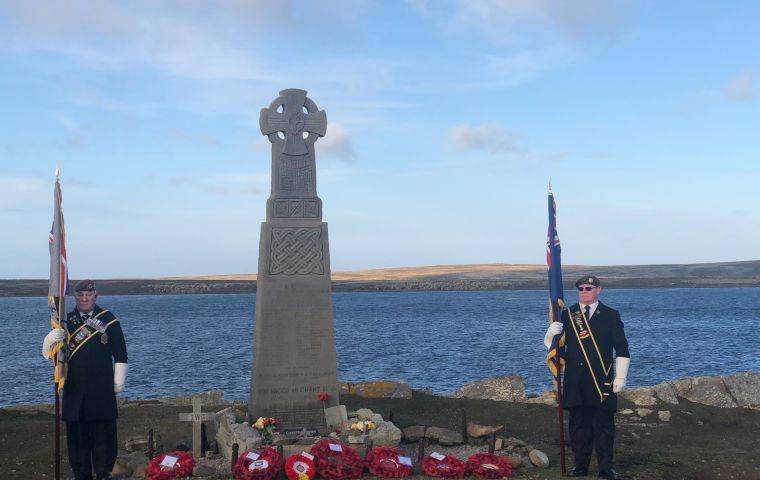MercoPress. South Atlantic News Agency
Fitzroy air attack, Britain's major loss in a single incident in the Falklands War
 Wreaths were laid on behalf of the people of the Falkland at Fitzroy memorial, 40 years to the day since RFA supply ships were bombed in the waters off Fitzroy
Wreaths were laid on behalf of the people of the Falkland at Fitzroy memorial, 40 years to the day since RFA supply ships were bombed in the waters off Fitzroy Memorial services were held in the Falkland Islands and in Southampton for those who lost their lives when two Royal Fleet Auxiliary ships were bombed during the Falklands conflict.
Both Sir Galahad and Sir Tristram were attacked by Argentine Skyhawk jets on 8 June 1982, resulting in the largest loss of life in a single incident during the conflict by the British.
On Wednesday wreaths were laid on behalf of the people of the Falkland Islands at Fitzroy memorial, 40 years to the day since RFA supply ships were bombed in the waters off Fitzroy while Welsh Guards were waiting, with the tragic loss of fifty lives.
In 1982, Sir Galahad was preparing to transport troops onto Port Pleasant, near Fitzroy settlement. The ship, along with Sir Tristram, was spotted by Argentine fighter jets and subsequently hit by bombs, ultimately setting it ablaze and costing the lives of 32 Welsh Guards, eleven other soldiers and five civilian crew. Sir Tristram was also hit, with two of its Hong Kong Chinese crewman dying as a result.
Today #Falklands remember all those who lost their lives around the Fitzroy and Bluff Cove waters. We will remember them pic.twitter.com/OveRy8mU0o
— Falkland Islands Gov (@FalklandsGov) June 8, 2022
Philip Roberts, the Captain of Sir Galahad during the attack, told Forces News in Southampton he was heading back into the chart room when there was the sound of “jets screaming overhead.”
He added: “The ship was being called to action stations and just as I closed the door it blew open again and a great cloud of smoke shot into the chart room.”
John Hood, a Purser on Sir Galahad, said he remembers two aircraft flying overhead and thinking, “What next?” Then, “of course, bombs hit, the world just turned upside down and I was thrown about.”
Mr Roberts added that, after the bombs had hit the ship, he rushed to the bridge wing and could see “smoke coming out of the engine room to start with,” as well as items exploding out of a hatch that was open ready to offload the Welsh Guards equipment.
“My first reaction really was to try and get everybody out onto the upper deck,” he said.
“I knew the Welsh Guards and troops were down below, so the longer they stayed down there, the greater danger they would be in, so I grabbed the ship's internal broadcast microphone and yelled 'abandon ship, abandon ship'.”
Mr Hood said it was important to veterans of the conflict to “remember those that didn't make it and what could have been for them.”
“Here I am, 40 years later… and I reflect on that,” he said.
Further memorial services in the coming days are scheduled, on Sunday midday, 12 June HMS Glamorgan Remembrance act at Surf Bay. Wreaths to be laid at the Glamorgan memorial to mark four decades on from the day 14 sailors died, when she was hit by an Exocet missile.
On Tuesday, 14 June, Liberation Day, Royal British Legion Commemorative Event, National Memorial Arboretum.
Veterans will come together to remember the key moments in the conflict, those who served and those who supported the Task Force, including merchant mariners, dock workers and civilians.




Top Comments
Disclaimer & comment rules-

-

Read all commentsBoard of Inquiry Report
Jun 11th, 2022 - 12:38 am 0https://falklandstimeline.files.wordpress.com/2022/06/board-of-inquiry-report-into-the-loss-of-rfa-sir-tristram-and-rfa-sir-galahad-june-8-1982.pdf
XXXXXXXXXXXXX.
Jun 11th, 2022 - 12:12 pm 0XXXXXXXXXXXXXXXXXXXXXXXXXXX.
XXXXXXX.
Commenting for this story is now closed.
If you have a Facebook account, become a fan and comment on our Facebook Page!